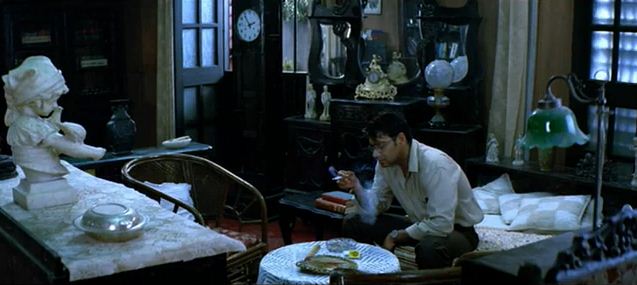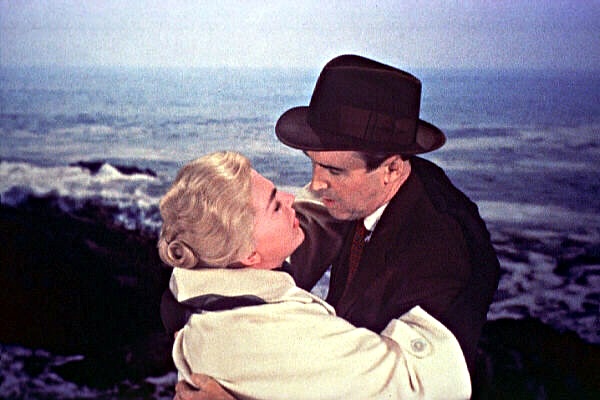Simran
Simran : Movie Review
3 stars out of 5 (Good)
Director : Hansal Mehta
2017, Hindi (English subtitles available)
Amriki Gal to Gora Chokhra : "Are you tired ? "
GC : Quizzical look
AG : "Because you're running in my mind ! "
You can slather masala butter on that profoundly corny dialogue and sling it all over the aisles ! ; but the heroine of this movie - Praful Patel - calmly acknowledges her ham-fisted punchline and asks for another drink to jazz up her flirting skills. Her corrective measures later in the film severely tax empathy, even as the film maintains a light-hearted tone. This is where the lack of psychological depth starts at to gnaw at the pink spunky heart of 'Simran', but this is, nevertheless, an unusual film which cuts through Mumbai filmdom's mores. It is set entirely in the U.S.A and follows the travails of an American young lady as she stumbles into crime. One of the aliases she gives, is named "Simran' - a nod to the real-life character of Punjabi origin who loosely inspired this picture.
That American thirty year old lass, who turns out to be the movie's biggest strength, is a character essayed with brilliant delight by Kangana Ranaut. Her gifting acting chops can portray a downbeat martyr (as in 'Shootout at Wadala') with the same conviction as she can sculpt a consistently effervescent girl who coolly shrugs off the useless men in her life and looks forward to a solo life with her own apartment. Ranaut, from start to finish, is a breath of fresh air, creating a persona who is determined not to sink her cheery bold spirits despite all the filth that life serially flings at us. She's no goody-two-shoes either, with a range of activities that would not make it into a politician's winning pitch but that is what makes her bubbly honest persona so refreshing - you get what you see, with no concealed hypocrisy.
Director Hansal Mehta comes to this film in excellent form , with his two previous works 'Shahid' (2013) and 'Aligarh' (2015) both being socially incisive, emotionally observant films. That same caliber of narration, however, is missing in 'Simran', with neither the script nor the direction reaching evolved heights but Mehta, to his credit, consistently shows glimpses of what makes him a good director. He finely channels many good performances and ensures that there are no lackluster sequences at all. Many Hindi films set abroad fall prey to clumsy protectionist tendencies but Mehta and writer Apurva Asrani have the audacity not to ultimately shove candy-floss into the unapologetic meat of their story.
Those positives aside, 'Simran' does suffer from a shortage of delicate psychological shading to fill the gaps, and a brazen laziness in maintaining the reality quotient in some key situations. The editing at the film's climactic scene is dodgy, a car-chase at the end is shot with fail-grade quality, and quite strangely, some scenes showing Praful being physically hit are clumsily cut out.
Mehta and Asrani also err gravely in showing the only black character in the film to be a two-dimensional vicious thug. Is this the sum of their sensitivity and understanding towards black Americans ? The white Americans come off nominally better - there are no substantive roles for them in 'Simran' (!) ; a bartender comes off favourably (although he could have been more realistic than a cardboard cut-out goody character), and a real-estate agent seems decent, but that's it.
After suddenly developing a shockingly reckless gambling streak in Vegas that bankrupts her, Praful tumbles into a vortex of financial obligations that bring her to a point where she decides to rob banks to get funds for loan repayment. Interestingly, or even amazingly, these banks in and around Atlanta she picks out have no guards ( I have seen no guards either in the banks I have visited in my city , and while statistics show that armed guards unwittingly create a greater chance of violence in robberies, it is also a testimony of many robbers that they avoid banks with guards, armed or otherwise). The police act like clueless morons. You'd think that after news of the first bank robbery gets splashed over TV, surveillance measures would rocket up but Praful's repeated getaways seem so easy, with no one tracking her later.
A light-hearted breezy tone, which is patently misguided, informs the coverage of her bank robberies. I'm not saying that it should be deadly somber but there is a deft middle ground unevidenced here. We eventually realize that Praful, for all her gutsy actions, is prone to becoming dangerously unhinged when pressured. But while she might be so inherently perky that she maintains her upbeat temperament even through that phase of robberies, at least some moments showing her mental discomfort and fear in the aftermath of those robberies, would have been invaluable in building an audience connection (after all, as we eventually note, she is not a psychopathic criminal).
While crime in films is always tricky territory, one eminently handy technique is to so persuasively construct the build-up to the crime committed by a supposedly good character, that the audience actually roots for the get-away. Here, though I liked Praful, the unconvincing build-up and descent into bank robbery so disconnected me that I would not have reacted in great sorrow even if her head were blown off during the robberies.
Supporters of her pictured persona might point out how she genuinely feels sorry when a teller under attack gets a serious asthma flare. "It's alright, I can go to another bank! " she tries to placate the breathless teller. This scene was obviously constructed to show us the good, cute side of Praful even during the heat of a bank robbery - yes, I found it amusing but I felt not an iota of support for her.
Nevertheless, Praful is given a terrific introduction in the film's opening scenes. She brings pizza to munch with her mother and father in their house, and their table-side conversation is a brutally realistic one, rarely evidenced in "family" Hindi cinema of the mainstream, in which the father has enraged venomous outbursts over his daughter not living up to expectations. Praful sportingly parries away a lot of these remarks, but as the attacks escalate, her face falls and she withdraws. There is a cheery completely unresentful tone to her replies as she breezily cuts down the her real-estate agent's stereotypical presumptions when he does a sales pitch for her apartment. She is her usual sunny self when her friend persuades her to come for a Las Vegas trip, but notice how smoothly Ranaut changes to a lower gear when she eventually has to decline the offer.
Thirty years old, with a divorce behind her, she agrees, for hidden reasons, to meet a second suitor named Sameer (Sohum Shah). Tall, dark, and unconventionally handsome, the boy has such an unadorned optimisim and honesty that when Praful tries to quietly bully him into cynicism, he is unmoved in his clean convictions. That's when she mellows down, acknowledging a genuine article when steadily senses one. Praful might even say that she can live her whole life without the obligation of partner or a husband - I will not argue with her but if at some point she does agree to have a second go at marriage, here is the bloke who she might have a survivable marriage with.
You'll notice I identified her as 'American' and not 'Indian-American'. Yes, she has an Indian accent but she is clearly committed to life in the U.S.A, and she seems believably happy in her milieu. This week , there is an illuminating article in the New York Times written by Thrity Umrigar about how she identifies as an American writer, even as those around her are keen on labelling her 'Indian-American'. I call Praful American not because she is sexually independent (without sarcasm, it can be stated that there is no shortage of sexually independent women in India for that matter) , rather it is due to that fact that that identity seems the proper fit for her.
The film, wittingly and unwittingly, generates a fair deal of psycho-social issues. When her new suitor discusses the prospect of past boyfriends when the issue of undesirable qualities is brought up, Praful neatly smilingly avers that courting boyfriends is a talent, not a demerit ! There is a hilarious scene where she chuckles and hurls abuses at a certain father, joined by eager support from her own father when they look at TV footage of the disguised Praful and pontificate how badly that burglar's father might have brought her up. The role and responsibility of the mother too in bringing up the child is neatly glossed over.
As good as Ranaut's performance is, it is quietly matched by the thorougly realistic multi-nuanced act by Hiten Mehta who portrays her father. Akin to a character directly transplanted from real-life, Mehta essays an ordinary man,a flawed persona who often gets enraged at his wayward daughter. He is street-smart but cannot parlay that wisdom to realize and accept that his own daughter who he's seen his whole life, is too brittle to live up to his expectations. His cheap-minded outbursts alternate with moments of genuine warmth, affection and even reserves of pampering forgiveness that would have eluded other fathers.The majority of India's film awards are shamelessly corrupt - I'd be surprised if even one of them seriously considered the Best Supporting Actor award to truly deserving performances like this one from a lesser known actor. And then you have Sohum Shah who portrays the afore-mentioned fiance with extraordinary depth of heart. I didn't doubt him, partly due to his performance and partly because I have seen people like him in real life. It is characters like this, and the story's overall honesty that marks out 'Simran' as a notable film.
UPN
UPNWORLD welcomes your comments.










0 COMMENTS
WRITE COMMENT